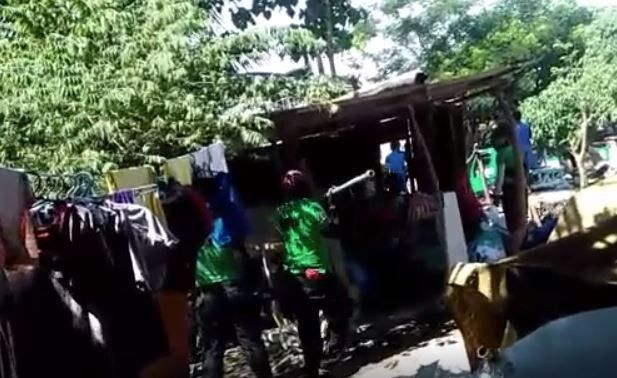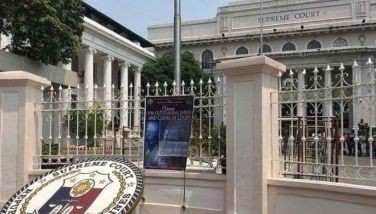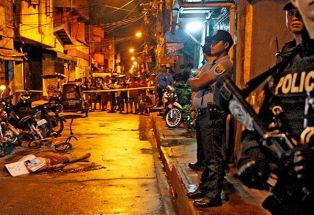Urban poor face evictions even as pandemic requires them to stay at home

MANILA, Philippines — Even as thousands of Filipinos have been forced to live in precarity by the COVID-19 pandemic, evictions by government agencies have rendered more than a dozen families homeless in the past week, a non-government organization said.
In two statements sent to Philstar.com, non-profit Urban Poor Associates said that 25 families living along the Philippine National Railways Southrail in Cabuyao, Laguna have already been evicted with the last remaining household due to be demolished soon.
The first five homes were demolished on July 15, followed by 20 more on Tuesday.
Alicia Murphy, executive director of the Urban Poor Associates said in one statement: “We condemn all forms of eviction and demolition at this time of pandemic, especially if the government violates the law that protects urban poor dwellers against unlawful evictions. The people need their homes to fight against COVID-19."
Under government guidelines, demolitions of informal settlers' homes need prior planning by the local government unit, which will include a census and physical survey of the area where people will be relocated from.
The community must also be given advance notice of the planned relocation and an explanation why it is necessary.
"If the house that protects people from the disease will be demolished, where will the people go? The government that is supposed to help the people at this time of pandemic, is instead making the poor people more vulnerable to the disease through unlawful eviction," Murphy said.
One resident of Barangay Dos, Michael Labad, said that families in the community were left “traumatized by the PNR and PNP eviction" after the Barangay Women’s Desk called them one evening in July to inform them that they only had five days left to stay in their place until some 30 meters of land flanking the railway would be demolished.
“In Barangay Dos, PNR Southrail, Cabuyao, Laguna there will be 200 to 300 families that will be affected by eviction. We are asking the government to stop eviction in our area to please have a dialogue with us, and not to leave us homeless in this time of pandemic," he said.
Ineng Pinamura, a senior citizen and also a resident of PNR for four years, said: “I was frightened when they demolished our house. That is our only home. My husband and I are both senior citizens, and we don’t know where we will go.”
But in a quarantine where police have been ordered to have no qualms arresting violators seen outdoors, where do the displaced have to go? "Why evict us when Filipinos are urged to stay at home?" they ask.
Transportation projects
The NGO also told Philstar.com in an online exchange that the demolitions were facilitated by demolition teams led by PNR, while elements of the national police were also sent to stand watch "as part of (the) eviction process to observe that no human rights will be violated."
An estimated of 91,389 families of informal settlers will be affected by the construction of the Philippine National Railway extension, which includes one commuter line from Manila to Calamba, Laguna and the South Long-Haul project from Manila to Bicol. Urban Poor Associates said in its statement.
The Philippine National Railways extension projects are among the many projects under President Duterte's flagship "Build, Build", Build program derailed by the coronavirus pandemic.
In a paper published by the Ateneo Center for Economic Research and Development, a group of economists cited railway projects, among others, that would prove to be unsustainable should the coronavirus pandemic extend.
"Should COVID-19 social distancing measures be required for the foreseeable future, tremendous subsidies may be required to keep such railways commercially afloat. Along with debt payments for foreign-funded projects, these subsidies could thus ‘crowd out’ domestic public resources which could otherwise be allocated for pandemic-related investments," they wrote.
Displacement for the promises of progress in public transportation also occurred in the wake of the department's push to further its modernization program for traditional public utility vehicles mid-pandemic.
'Professional squatting'
In a letter submitted to Cabuyao Mayor Mel Gecolea, families in the community pleaded to stop the evictions for the duration of the pandemic. "They have wives, children and parents who would be vulnerable to the disease if they lose their homes by eviction," the NGO said.
According to Urban Poor Associates, the evicted families were forced to stay on the streets and put up makeshift tents on the road "without protection from the heat, rain, and the disease."
Sought for comment by Philstar.com, Philippine National Railways General Manager Junn Magno told a very different story.
According to Magno, the families whose homes were demolished only showed up recently and built structures in the area's "danger zone" along the train's path to try to get on the master list of families qualified for resettlement.
In a phone call, he said the PNR already has a resettlement agreement with existing settlers, which includes the danger zone where they are not allowed to build on, that the PNR is going to uphold.
Asked what will happen to those who used to live in the newly demolished homes, he said: "They don’t have a relocation. Our agreement with the settlers is that we have a space where they can’t settle. If they do, they’re not even considered informal settlers, you’re just endangering yourself practically. So it’s not a question of relocation anymore. They’re not part of our relocation."
"They should go back to where they came from. They suddenly showed up there to put up structures and get entitlements of their own...we have a masterlist, and it shows the people living there and the specific parcels of land [and] if you’re not there, you are asking for free money. That’s called professional squatting. They have no entitlement because they’re endangering themselves. That’s like saying we’re compensating someone who wants to commit suicide...you’re just endangering yourself practically. So it’s not a question of relocation anymore. They’re not part of our relocation," he added.
Though Section 28(b) of the law allows eviction and demolition "when government infrastructure projects with available funding are about to be implemented," Republic Act No. 7279 or the Urban Development and Housing Act mandates the following during demolitions:
- Notice upon the effected persons or entities at least thirty (30) days prior to the date of eviction or demolition;
- Adequate consultations on the matter of settlement with the duly designated representatives of the families to be resettled and the affected communities in the areas where they are to be relocated;
- Presence of local government officials or their representatives during eviction or demolition;
- Proper identification of all persons taking part in the demolition;
- Execution of eviction or demolition only during regular office hoursfrom Mondays to Fridays and during good weather, unless the affected families consent otherwise;
- (8) Adequate relocation, whether temporary or permanent: Provided, however, That in cases of eviction and demolition pursuant to a court order involving underprivileged and homeless citizens, relocation shall be
undertaken by the local government unit concerned and the National Housing Authority with the assistance of other government agencies within forty-five (45) days from service of notice of final judgment by the
court, after which period the said order shall be executed:
Department of the Interior and Local Government (DILG) Memorandum Circular No. 2020-068 also directs local governments to postpone demolition and eviction activities and to "provide interim shelter facilities for affected communities who will be demolished within the locality and finally provide appropriate financial assistance, relief, and other basic services."
In response to Magno's claim, Princess Esponilla, Media Advocacy Officer, Urban Poor Associates told Philstar.com: "This is not a question of ngayon lang sila nakatira (they only moved here now) because we have people's profile, it is the question of eviction without due process at the time of pandemic."
Earlier in March, the United Nations urged governments to take “extraordinary” measures to ensure that homeless and informal settlers have access to adequate housing to protect them against the coronavirus pandemic.
"The period of entitlements when we were [listing] took almost a year. We did it one by one in the resettlement action plan. So it’s impossible what they’re saying, that they’ve been there for four years [because] we have a masterlist, and it shows the people living there and the specific parcels of land," Magno said.
"The entitlement process that JICA and ADB did, we support all of that. If you’re not there, you are asking for free money. That’s called professional squatting. They have no entitlement because they’re endangering themselves. That’s like saying we’re compensating someone who wants to commit suicide," he added.
Academics have said that government agencies benefit from the popular imaging of the poor as lazy and dirty enemies of progress that is also usually favorable to big businesses as demolition projects are in turn framed as necessary for 'economic development,' 'urbanization', 'infrastructural projects' and similar language.
They also said in an earlier exchange with Philstar.com that the government routinely makes use of such "developmentalist vocabulary" in justifying demolition projects and displacing informal settlers.
They say they were not consulted or given a notice of demolition beforehand, only a phone call one evening saying they had days to vacate the area. @PhilstarNews
— Franco Luna (@francoIuna) July 22, 2020
????: Urban Poor Associates/Brgy. Dos Residents pic.twitter.com/7KgcyeXE8k
- Latest
- Trending
































